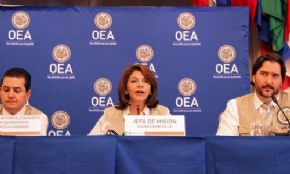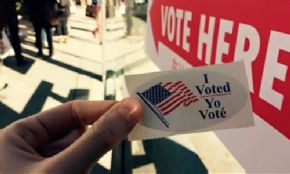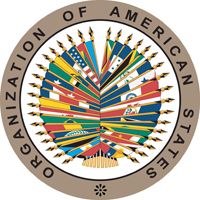Rapport d'Evaluation des Elections Présidentielles US par les Experts de l'Organisation des Etats Américains

L'Organisation des Etats Américains effectue des missions d'observation des échéances électorales dans ses Etats Membres. Elle a ainsi dépêché une mission composée de 41 experst qui répartis dans plusieurs Etats fédérés des Etats Unis ont observé le processus électoral mis en place à l'occasion de la Présidentielle américaine du 8 novembre 2016. La mission a pu constater avec satisfaction le déroulement du processus conforme aux principes de la Charte de l'OEA.
Elle a aussi relevé des améliorations à apporter pour les prochaines échéances électorales aux Etats Unis.
Le texte officiel en langue anglaise faisant foi
"The report of the Mission highlights strong points and opportunities for improvement in the electoral process in the United States.
The Electoral Observation Mission of the Organization of American States (EOM/OAS) to the general elections in the United States today congratulated the winners - especially President-elect Donald Trump - and recognized the civic behavior of the citizens and the officials who participated in the process, in its presentation of the preliminary report on its work, which mentioned the strong points and opportunities for improvement in the process.
The report, based on the observations of the 41 members and thematic experts of the Mission deployed in the states of California, Colorado, Iowa, Kansas, Maryland, Minnesota, Montana, Nebraska, New York, Rhode Island, Virginia and Wisconsin, as well as the District of Columbia, recognizes that normalcy prevailed across the country, and when issues arose, "solved efficiently following the contingency procedures that were in place."
The Mission also highlighted that, at the conclusion of an electoral campaign marked by polarization, the electoral process confirmed that "U.S. democracy goes beyond the particularities of an electoral process. It is based on its institutional strength, freedom of expression and press, balance of power, the rule of law and the principles on which this country was founded."
The Chief of Mission and former President of Costa Rica Laura Chinchilla said that, at the end "of a passionate and controversial campaign, citizens were able to express their differences through institutional mechanisms, in a free, harmonious, and respectful way. This attitude will be what should inspire the political leadership of this country, to achieve the complex but urgent task of uniting the people in the search for common aspirations."
"We congratulate Donald Trump, the 45th President-elect of this country and heir to an institutional legacy of democracy, freedom and tolerance. Moreover, we celebrate the attitude of Secretary Hillary Clinton, who with great democratic conviction recognized the electoral results and offered her collaboration to the next President," she added.
The report - that specifically analyzes the issues of electoral organization, the use of technology, political participation, campaign finance and media, highlights, among other issues, the following strengths:
The political process is public, transparent and verifiable, and is based on weights and counterweights at every step.
The systems for resolution of controversies work efficiently and expeditiously, something particularly noteworthy in the case of ordinary justice
Voting centers opened on time, had all necessary materials and were staffed with properly trained officials
"The culture of service and professionalism of electoral officials observed across the different states", that "provided voters with a safe and convenient way to vote."
The efforts of electoral efforts to facilitate access for persons with disabilities.
Among the opportunities for improvement identified by the Mission are:
Taking measures to avoid the excessive concentration of voters and long lines in the voting centers.
Broaden the cooperation between states to compare information and avoid possible duplications in voter registries.

Expand the practice of designing electoral districts through independent, non-partisan commissions.
Analyze the impact of the decision of the Supreme Court to eliminate parts of the Voting Rights Act of 1965.
Establish better and stricter rules to govern PACs and super PACs.
Leave behind the polarizing and divisive campaign rhetoric and promote a civil dialogue between opposing visions.
The OAS Mission will present a final report to the Permanent Council of the OAS in the coming months."
Plus d'infos surl'OEA
L'Organisation des États Américains est l'institution régionale la plus ancienne du monde. Ses origines remontent à la Première Conférence internationale américaine tenue à Washington (États-Unis) d'octobre 1889 à avril 1890. Cette réunion aboutit à la création de l'Union internationale des Républiques américaines et, dès lors, commence à se tisser tout un réseau de dispositions et d'institutions qui sera plus tard dénommé « Système interaméricain », le plus ancien système institutionnel international.
L'OEA est fondée en 1948 lors de la signature à Bogota (Colombie) de la Charte de l'OEA qui entre en vigueur en décembre 1951. Par la suite, cet instrument sera amendé par le Protocole de Buenos Aires signé en 1967 et entré en vigueur en février 1970 ; par le Protocole de Cartagena de Indias signé en 1985 et entré en vigueur en novembre 1988 ; par le Protocole de Managua signé en 1993 et entré en vigueur en janvier 1996 et par le Protocole de Washington signé en 1992 et entré en vigueur en septembre 1997.

L'Organisation est créée dans le but d'obtenir dans ses États membres, comme le stipule l'Article premier de la Charte, « un ordre de paix et de justice, de maintenir leur solidarité, de renforcer leur collaboration et de défendre leur souveraineté, leur intégrité territoriale et leur indépendance ».
Aujourd'hui, l'OEA regroupe l'ensemble des 35 États indépendants des Amériques et constitue la principale tribune gouvernementale du Continent pour les questions d'ordre politique, juridique et social. En outre, elle a octroyé le statut d'observateur permanent à 69 États, ainsi qu'à l'Union européenne (UE).
Pour mener à bien ses plus importants objectifs, l'OEA s'appuie sur ses principaux piliers qui sont la démocratie, les droits de l'homme, la sécurité et le développement.